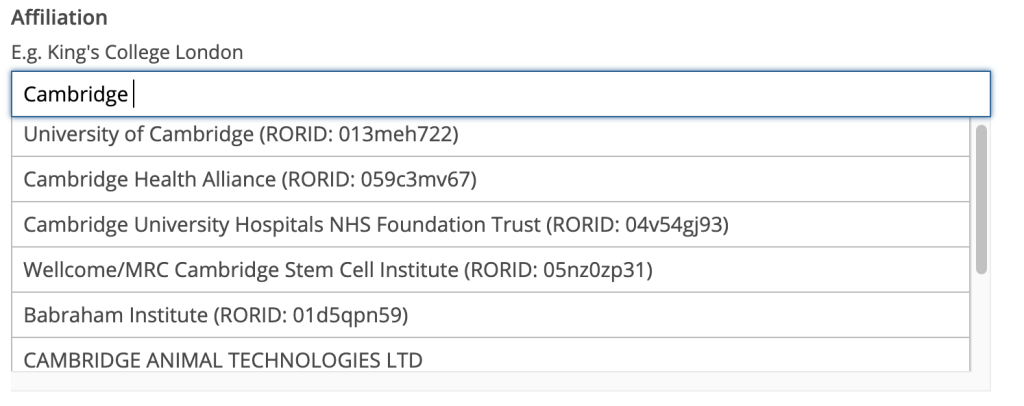Europe PMC is a full text, open access database of life science literature. It uses persistent identifiers to link publications to people, institutions, data and other research outputs. Europe PMC has now announced that its Grant Finder tool for active and completed grants from Europe PMC funders now integrates Research Organization Registry (ROR) IDs. This allows users to easily find grants awarded to the same institution under different aliases, such as European Molecular Biology Laboratory, also known as EMBL.
This integration will support funding organisations that want to understand the impact of the research they support. We hope this project can serve as a basis for further adoption of ROR IDs, for example to link institutions to new types of research outputs.
Support research reproducibility and transparency
In Europe PMC, articles and preprints are linked to data, protocols, peer review materials and other research outputs. Publications are also linked to grants awarded by Europe PMC funders. Grant awards in Europe PMC can be searched using the Grant finder tool and Grants API. Grant information includes the institutional affiliation of the principal investigator, who is awarded the grant. However, there are many institutions with multiple aliases, for example due to case sensitivity, word order, or abbreviations.
To disambiguate institution names, the Research Organization Registry (ROR) was launched by the California Digital Library, Crossref, and Datacite in 2019. ROR provides a global community-led registry of open persistent identifiers for research institutions. When using the Grant Finder prior to ROR integration, users needed to include multiple institution aliases to find all grants linked to that institution.

To address this challenge, Europe PMC has mapped institutions in the Europe PMC grant database to their corresponding ROR IDs. This allowed the team to aggregate organisational aliases under one single name and auto-suggest matching affiliation in the Grant finder tool using the ROR ID.
In practical terms this means that when users search for an institution in the Grant finder tool, they can find grants associated with different versions of an institutional name. It is also possible to retrieve over 2600 ROR IDs associated with grants from Europe PMC funders in the GRIST API core response for programmatic analyses.

Future plans for ROR IDs in Europe PMC
Europe PMC first integrated ROR IDs for publication affiliations in 2019. Later on, in 2021 as part of the FREYA project, Europe PMC developed the ROR Predictor prototype, a freely-available open source tool that enables matching of author affiliations to ROR IDs for research publications.
The current integration of ROR IDs in the grant data can help reduce administrative burden for research reporting and support DORA-compatible research assessment for funders and institutions.
Going forward, we plan to add ROR IDs to author affiliations for accepted manuscripts and preprints supported by Europe PMC funders. We believe that further incorporation of ROR IDs into scholarly outputs can provide a wider connectivity between research outputs and support creation of new tools that build on this rich scholarly network.
To find out more about ROR IDs and their integration in the Europe PMC Grant finder tool please watch the ROR Community call recording and read the Europe PMC ROR Case Study.
Read more on the Europe PMC blog.
Edit